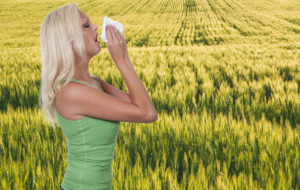Grass Pollen Allergies in the Washington, DC Metropolitan Area
 In the Washington, DC, Northern Virginia, and Maryland metropolitan area (DMV area), grass begins to pollinate in late-April to early-May, peak in late-May or early-June, and end in August. In addition to the grass pollen during this time period, molds spore counts are also highly elevated which further complicates one’s allergies. There is also an overlapping with tree pollens in the early Spring, meaning that all three allergens (trees, grasses, and molds) are in the environment at the same time during some periods in the Spring.
In the Washington, DC, Northern Virginia, and Maryland metropolitan area (DMV area), grass begins to pollinate in late-April to early-May, peak in late-May or early-June, and end in August. In addition to the grass pollen during this time period, molds spore counts are also highly elevated which further complicates one’s allergies. There is also an overlapping with tree pollens in the early Spring, meaning that all three allergens (trees, grasses, and molds) are in the environment at the same time during some periods in the Spring.
The most common types of grasses include Timothy, Sweet vernal, Bermuda, Rye, Kentucky blue, Orchard, Meadow fescue, Red top, Bahia, and Johnson. Grass pollens, unlike other environmental allergens, are very similar in their microscopic appearance. This fact is the reason why an individual who is sensitized with one type of grass may have allergy and/or asthma symptoms when exposed to many other types of grasses. The one major exception to this rule is Bermuda grass, which does not cross react with many other grasses.
As with the other allergens that cause hay fever (allergic rhinitis), allergic conjunctivitis, and/or asthma, it is the wind disbursement of the grass pollen into the air that sensitizes individuals. Since the grass pollen is very light in weight, the wind causes the pollen to be carried in the air where people inhale the pollen and have direct contact with the pollen and their eyes. It is this interaction that causes some people to develop allergies to the grass pollen which in turn causes the classic symptoms of hay fever, allergic conjunctivitis, and/or asthma. These symptoms may include some or all of the following: sneezing, itchy nose, runny nose, nasal congestion, post-nasal drip, sore throat, hoarseness, itchy eyes, watery eyes, puffy eyes, sinus congestion, sinus pain, wheezing, coughing, shortness of breath, and/or fatigue.
Grasses tend to pollinate more the longer they grow. Therefore, keeping one’s lawn mowed reduces the grass pollen that enters the air. It is the tall grasses found in empty lots and by the sides of the roads, etc. that is the primary cause of the high grass pollen counts found in the Spring in the Washington, DC area. Warm, windy, and dry days tend to increase the grass pollen counts. The grass pollen counts also tend to be the highest in the early mornings.
There are preventive measures that should be practiced by all grass allergy sufferers and include the following:
- Although it is better to have the lawns mowed, the allergic individual should avoid mowing lawns. If he/she must mow the lawn, wearing a filtered mask may help reduce grass pollen exposure.
- Turn air conditioning on.
- Change air filters monthly.
- Keep sunroofs and windows closed.
- Shower, wash hair, and change clothing after coming back inside.
- Avoid yard work or wear a filtered mask.
- Wash pets after they go outdoors.
- Re-circulate air in car so it doesn’t come in from the outside.
- Drive a car that has an air filter, if possible.
The board certified allergists at Black & Kletz Allergy have been diagnosing and treating grass pollen allergies in children and adults in the Washington, DC, Northern Virginia, and Maryland metropolitan area for more than half a century. If you experience any of the above symptoms in the late Spring and Summer, you may suffer from grass allergies. It is important for a board certified allergist to perform a detailed history and physical examination. Allergy testing can be performed via the skin or blood to determine if one has an allergy to grass or other environmental allergen such as trees, molds, etc. Treatment begins with prevention. It may not be possible to completely avoid exposure to grass pollen, however, certain preventive measures can still help alleviate some of the suffering. There a wide array of medications that can be tried which may include tablets, capsules, syrups, powders, nasal sprays, eye drops, and/or asthma inhalers. Allergy immunotherapy (also referred to as allergy shots or allergy desensitization) is a very effective means to treat grass and other environmental allergies. It is effective in about 80-85% of patients. They have been around for over 100 years. They can be given to almost anyone, including children and pregnant women.
If you would like to be seen at one of our 3 convenient locations in Washington, DC, McLean, VA (Tysons Corner, VA), or Manassas, VA, please call us to make an appointment. Alternatively, you can click Request an Appointment and we will get back to you within 24 hours by the next business day. We have parking at each office location and we are Metro accessible at our Washington, DC and McLean, VA locations. Black & Kletz Allergy provides a friendly and caring environment for you to get the top quality allergy, asthma, and immunology treatment that we have been providing the community for more than 50 years and that you deserve.
